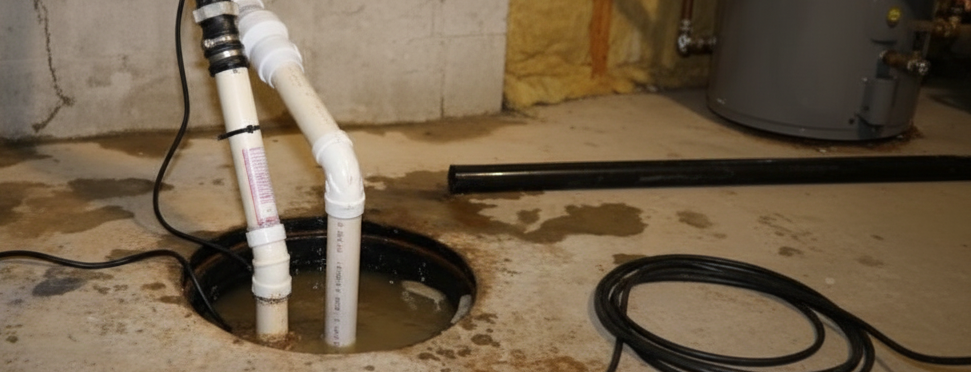Sewage Pump Replacement in Rock Hill, SC
Fill Out A Form

Benefits of Sewage Pump Replacement
- Restore Home Functionality: Immediately allows you to resume using basement bathrooms, laundry facilities, and other low-level plumbing fixtures with confidence.
- Protect Your Property: Prevents catastrophic damage to your basement, foundation, and personal belongings caused by messy overflows and backups.
- Eliminate Foul Odors: A new, properly sealed pump system contains and expels sewage efficiently, getting rid of unpleasant smells for good.
- Long-Term Reliability: Gain complete peace of mind with a modern, high-performance pump that eliminates the worry of sudden and messy system failures.
- Quiet and Efficient Operation: Newer pumps run more quietly and efficiently than older, failing models, reducing noise and potential energy consumption.
Ensure the health, safety, and functionality of your home's plumbing with an expert sewage pump replacement by JP Septics.
Expert Sewage Pump Replacement in Rock Hill, SC
When your sewage pump fails, it’s more than an inconvenience—it's an urgent problem that can lead to messy, unsanitary backups in your home. For homeowners in Rock Hill, SC, a functioning sewage pump is critical, especially for basement bathrooms or properties below the main sewer line. JP Septics is your trusted, local solution. As a locally owned business with a reputation backed by over 500 satisfied customer reviews, we have the expertise to replace your failing pump quickly and correctly, restoring your home’s essential plumbing.
5 Telltale Signs You Need a Sewage Pump Replacement
A sewage pump often gives warning signs before it fails completely. Acting on these symptoms can help you avoid a messy emergency.
- The Alarm is Sounding: Most systems have a high-water alarm. If it goes off, it means the pump isn't removing wastewater effectively.
- Constant Operation: If you can hear the pump running continuously, even when no water is being used, it may be struggling to keep up or the float switch could be stuck.
- Failure to Activate: If your drains are backing up and you don't hear the pump turn on, the motor has likely failed.
- Strange Noises: Grinding, rattling, or unusually loud humming sounds from the pump basin can indicate a damaged impeller or failing motor.
- Foul Odors: Strong sewage smells coming from the pump's basin or nearby drains suggest that the pump isn't sealing or emptying the basin properly.
Our Transparent Replacement Process
We follow a professional, safety-focused process to ensure your new sewage pump is installed for long-term reliability.
- Safety and Diagnosis: Our first step is to safely disconnect power to the pump. We then perform a final diagnosis to confirm that the pump has failed and replacement is the necessary solution.
- Pump Out the Basin: We will professionally pump out any remaining wastewater from the sewage basin to create a clean and safe working environment.
- Remove the Old Pump: Our technician will carefully disconnect and remove the old, failed pump, check valve, and any worn-out components.
- Install the New Pump: We install a high-quality, correctly sized sewage pump and a new check valve. Proper sizing is critical to ensure the pump can handle your home's needs without short-cycling or being overworked.
- Test for Proper Function: After installation, we reconnect the power and test the full operational cycle, including the float switch and alarm system, to guarantee everything is working perfectly.
Why Choose Us
When you need a crucial piece of equipment like a sewage pump replaced, you need a contractor you can trust. Here's why Rock Hill residents choose JP Septics:
- Proven Customer Satisfaction: With over 500 satisfied customer reviews, our track record for quality work and professional service is well-established.
- Locally Owned and Operated: We're part of the Rock Hill community, and we are committed to providing our neighbors with honest, reliable service.
- Expert Technicians: Our team has the specific experience required to correctly size and install sewage pumps for optimal performance and longevity.
- Focus on Quality: We use high-quality pumps and components to ensure your replacement is a lasting solution, not a temporary fix.
Frequently Asked Questions
How long does a sewage pump last?
A quality, professionally installed sewage pump typically lasts between 7 and 10 years. Its lifespan can be affected by the frequency of use, the quality of the pump, and whether it receives periodic maintenance.
What happens when a sewage ejector pump fails?
When a sewage ejector pump fails, it can no longer pump wastewater out of the home, leading to sewage backing up into drains in the lowest level of the house, such as basement showers, toilets, and floor drains.
Can a sewage pump be repaired?
While some minor issues like a stuck float switch can sometimes be repaired, it is often more cost-effective to replace a sewage pump if the motor has failed or the unit is old. The labor costs for a complex repair can quickly approach the cost of a new, more efficient unit.
Restore Your Home's Essential Plumbing Now
A failed sewage pump puts your home at immediate risk of a messy and unsanitary backup. The experts at JP Septics can quickly and professionally replace your unit with a high-quality, reliable pump, getting your plumbing back in order fast. Don't wait for a disaster—contact us now for expert sewage pump replacement service.
More Frequently Asked Questions About Sewage Pump Replacement Services
Find answers to common questions about our septic services in Rock Hill, SC and the surrounding areas.
How do I know if my sewage pump is bad?
You can tell your sewage pump is bad if it makes loud grinding noises, fails to turn on causing backups, or runs constantly without shutting off. A frequently tripping circuit breaker connected to the pump is another clear sign of a motor problem.
Why does my sewage pump alarm keep going off?
The alarm on your sewage pump goes off when the water level in the basin gets too high, which typically means the pump is not turning on to empty it. This could be due to a failed pump, a stuck float switch, or a power outage.
What is the difference between a sump pump and a sewage pump?
A sump pump is designed to remove groundwater that collects around your foundation, and it only handles water. A sewage pump (or ejector pump) is designed to handle wastewater and solid waste from toilets and drains, grinding it up and pumping it to the main sewer line.
Should there be water in my sewage ejector pit?
Yes, it is normal for a sewage ejector pit to have some level of water and waste in it. The pump is designed to activate only when the contents reach a certain level determined by the float switch.
How often should a sewage pump be serviced?
It's a good practice to have your sewage pump inspected and serviced annually. Regular service ensures the float switch is working freely, the check valve is functioning, and the pump itself is in good condition, which helps prevent unexpected failures.


